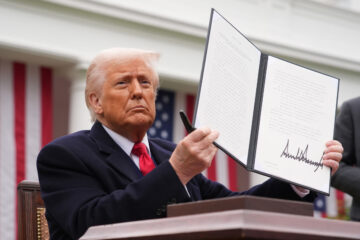Unlike most economic sectors, the U.S. auto industry has had a seat at the negotiating table regarding tariffs.
The auto industry was able to negotiate carveouts to President Donald Trump’s tariff agenda early on, giving markets a sign that the duty rollout would be well-thought-out and surgical.
💵💰Don’t miss the move: Subscribe to TheStreet’s free daily newsletter 💰💵
That early indication has not turned out to be the case, as the promise of targeted “reciprocal” tariffs has been replaced by the reality of 10% tariffs across the board (with exceptions for Canada and Mexico) and 140% tariffs against China.
Markets hate uncertainty, and after a rollercoaster week that saw historic drops and rises, it is no wonder the Cboe Volatility Index, better known as the VIX or Wall Street’s fear gauge, soared as high as 57.52 points during Tuesday’s session- the first time it has closed above 50 since April 2020.
Japanese automakers began anticipating the damage to their sector during a March meeting of the Japan Automobile Manufacturers Association (JAMA), according to a report from Automotive News.
Related: Tesla, Elon Musk make drastic decision amid U.S.-China trade war
“We will be looking at how to absorb short-term shocks and what concrete measures we can take to deal with these shocks, as well as how to deal with them in an all-Japan manner,” said JAMA Chairman Masanori Katayama.
Additionally, Katayama said the group discussed its strategies to absorb and mitigate potential tariffs with the country’s Ministry of Economy, Trade and Industry officials.
Now, the plans for at least one JAMA group member have been revealed.
Japanese automakers are reconsidering their strategy in a tariff-heavy world.
Kiyoshi Ota/Bloomberg via Getty Images
Mazda will bite the bullet, for now
This week, Mazda sent a letter to its U.S. dealers informing them that it would not raise its sticker prices or tack on import fees for any vehicles already on dealership lots or that will come into the country before May 1.
The letter, which the Wall Street Journal viewed, is Mazda’s response to the 25% tariffs on car imports. Despite Mazda having a plant near Huntsville, Alabama, that only makes up about 20% of the vehicles you see on American roads. Most of the Mazdas sold in the U.S. are built in Japan and Mexico.
The company expects tariffs to “have a significant negative impact” on the industry and its business and is working to reduce costs elsewhere, the Journal reported.
So, for now, the plan appears to be to do nothing. The company will have to pay more to import its vehicles, but it is willing to pay that cost for now.
Thanks to its decision, the company will absorb about $100 million in tariff-related costs in April.
Markets did not like this news, sending Mazda shares down nearly 4% Friday in Tokyo trading.
Sounding the alarm about tariffs
This isn’t the first industry document to leak about the tariffs.
In March, about 2 weeks after the President gave automakers a 1-month exemption on goods from Mexico and Canada, Ford management sent a memo detailing the Blue Oval’s plans.
Ford’s chief supply chain officer, Liz Door, said that the Blue Oval is “strategically stockpiling components where it is cost-effective and parts that are not pending engineering changes” before the deadline.
The memo also said that the automaker is reviewing its logistics routes and border crossing plans to maximize shipping efficiency.
More Automotive news:
General Motors delivers surprising business updateFord reports surprising news amid Tesla turmoilApple creates clever way to stop car thieves
“As the situation continues to develop, we require all suppliers to continue shipping parts in accordance with existing contractual terms, including pricing and delivery schedules,” Door said.
“We ask that you continue to utilize your best commercial efforts and encourage your team to take all possible measures to minimize the impact to your business and Ford.”
Related: Veteran fund manager unveils eye-popping S&P 500 forecast


